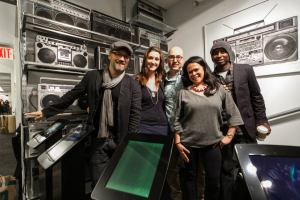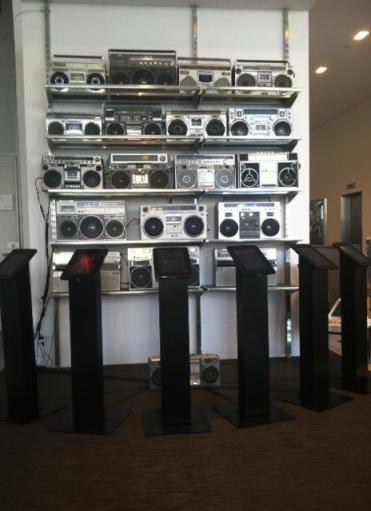written by Dave Hodge, Creative Director/ Partner, Finger Music
I’ve been hearing a lot of discontent and concern from many of my musician friends over Spotify, and all things file sharing. This of course, originates primarily with the epidemic of people thinking that music is as free as the air we breathe, with a complete disregard for the livelihood of the musicians who’ve toiled over it, not to mention hindering their ability to make money to record their next record that their fans will be so eagerly awaiting to download for free again.
Throughout the recent history of music, there have been constant reinventions around copyright and performing rights. Take the advent of the photocopier, for example. This crushed the sheet music business, while the recording business was blossoming. A complete shift in the structure of the music industry. Then take the cassette player, which made possible the unregulated re-recording of copy-written material. Again a major shift, and a big red flag for record labels in the way their revenue stream was structured. But through the status quo came a band with an open minded inventiveness, who foreshadowed the new model of our current reality’s addiction to free downloads. They were enormously successful because of it..The Grateful Dead.
Please do keep reading, I’m not stoned. Yes, a successful model embracing what we now see as a problem, digital downloads, was intentionally created 40 odd years ago, back when you were in the womb and your mom was smoking a joint. (Or vice versa, depending on how old you are). Let me explain…At their concerts, the Dead set up huge areas in front of the soundboard, where people were encouraged to bring high quality recording equipment -back then, cassette recorders and good quality mics- and record their concerts, for FREE. Thus began a huge market of bootleg tapes for their toasty brained followers, from which none of the proceeds went to the band.
Recorded music, to them, was a marketing tool. They wanted people to have it for free. I myself had a stash of them, so to speak. The result: absolutely enormous concert tours, generating hundreds of millions worth in ticket and merchandise sales (it seems Live Nation was paying attention). This was the pre-internet era, so the bootleg culture they allowed to happen can also be seen as a pioneering form of social media. Word of mouth and the creation of countless new fans listening to Grateful Dead bootleg tapes recorded around the world (in comparison, free downloads) without spending a cent on that aspect of their publicity, was essentially a form of unplugged Twitter. The Grateful Dead also created a massive mailing list, millions strong (one of the first bands -if not the first- to do so in such a personal way), again pre-internet, which also enhanced their loyalty based business model.
My point to all this comes back to the Spotify and online music ‘situation’ that dominates music today. Of course, people still did buy the Grateful Dead’s studio albums, but then again, that’s also the case with today’s current model. Not 100% of music is downloaded, and in 2010 roughly 50% of music was still purchased on CD, according to Digital Music News: http://tinyurl.com/3ekqweg
Now I myself can proudly say I have never downloaded a song for free for my listening pleasure (I have in relation to work, to research genres, but nothing I would listen to on my own), until now. I’ve recently discovered Spotify, the merits of which have been preached to me for ages from my friends in London (it was released there 2 years prior to the US), and I can see why. On the contrary I have heard it viciously cursed by artists who have done the math for the current royalty structure. They’ve figured that after many millions of plays, the royalty would amount to something equivalent to minimum wage. Don’t get me wrong, even Jerry Garcia’s joint would go limp with that kind of news. Maybe I’m being optimistic, but here’s what I think is happening.
The record industry has consented to this, as have a massive number of artists. Through DRM (Digital Rights Management) an artist can opt out of having their content on Spotify. But think of it this way… Spotify is essentially a Socialist based structure in which everyone pays the same thing, in great numbers, while they are essentially killing the mp3 as a means of sharing music in an untraceable way. All this music is streaming, and exists on ‘the cloud’. You have access to what seems like, everything. What a deal. But the deal that is happening behind the scenes, is to regain control of content. The mp3 is becoming obsolete.
So once this essentially Socialist (republicans, relax) system has everyone hooked, the mp3 is virtually replaced by the cloud. What you have then, are millions and millions of people with essentially bootleg tapes that someone else has full control over, and many, many things become possible. Raising user fees. Free Tweeting and Facebook advertising for artists. Accurate statistical data. (Wait… accurate royalty payments?? That has never existed, it’s always been based on audits and estimates). And if artist rights organizations and we artists ourselves are smart, we will stay on them like glue to start raising royalty rates. In the next decade, someone’s about to make a ton of money, and we need to make sure what happened in the 60’s and 70’s doesn’t happen again… where it was the bands MANAGERS that ran off in the goldfish boots with the lions share!
I really do believe that this is the best thing that’s happened to the music industry since the first mp3 reared it’s ugly head. Just give it some time, and if you’re an artist, get involved. Don’t sit back and complain that the world is going to hell. Have a deeper look into what the Grateful Dead did, even if you don’t like their music (I myself, am well over it). Besides frequenting the cover of High Times magazine, they were brilliant businessmen who through forward thinking and open-mindedness, have a lot to teach us about rethinking our current wheel.


